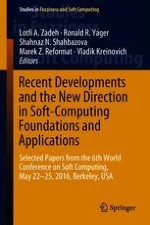2018 | OriginalPaper | Chapter
Game Approach to Fuzzy Measurement
Author : V. L. Stefanuk
Published in: Recent Developments and the New Direction in Soft-Computing Foundations and Applications
Publisher: Springer International Publishing
Activate our intelligent search to find suitable subject content or patents.
Select sections of text to find matching patents with Artificial Intelligence. powered by
Select sections of text to find additional relevant content using AI-assisted search. powered by
